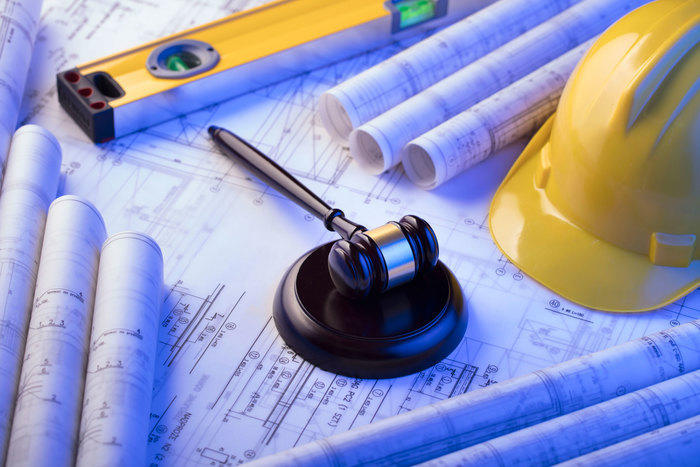Construction law is the body of law, rules, and regulations that govern the planning, design, and construction of buildings and structures. Various issues relating to construction can arise under local, state, or federal laws. Lawyers can work in all areas of construction law or specialize in one or two.
Workplace safety and employment laws kick in at the national level, along with hiring practices and worksite requirements. Cascading to the state level, there is also a range of safety, employment, and environmental regulations. Finally, at the county level are zoning ordinances and restrictions on noise.
Because of construction’s broad scope, the federal and state governments have a range of laws that govern construction issues. One of the prominent sets of laws is the building codes, which set forth the requirements and standards for developers in every state.
Building codes enhance safety by ensuring tradespeople install plumbing, electrical, and other fittings consistently. If a building contractor adheres strictly to the building code, the chances are that a catastrophic collapse or other significant failures will not occur. Construction attorneys advise contractors on following the codes, or they can defend a client accused of endangering people when failing to build by the code.
Another aspect of construction law is contract law. For instance, when builders or construction employees discharge their duties and their employer fails to pay, they can seek recourse through liens. Liens compel the developer to pay the workers’ wages.
What Does a Construction Lawyer Do?
Construction lawyers provide legal representation and advice concerning buildings or construction projects. They offer advice to organizations at various levels of the contracting chain. Some of the people they serve include property owners, developers, tenants, project managers, trade contractors, suppliers, and consultants. These lawyers have expert knowledge on construction contracts and can advise any party to a construction agreement on issues such as delays, variations, and defects.
Construction lawyers are essential because construction companies are often not sole proprietorships and can involve multiple parties at one time. This can make a construction dispute more complicated than other legal matters, and construction lawyers very valuable to their clients.
Some construction lawyers also represent their clients in court, filing pleadings, answering questions, and responding to complaints. These lawyers also draft and submit responses to interrogatories and requests for documents. Attorneys may also review documents such as contracts, floor plans, inspection reports, and blueprints and use them as exhibits in a court of law while prosecuting a case or defending a client.
Lawyers in this field may also handle weightier issues pertaining to wrongful death claims and workplace accidents. Such accidents may require them to file compensation claims and civil suits on behalf of their clients. Often, they liaise with the worker’s insurer and represent workers when evaluating damages and liability. If the lawyer cannot reach an out-of-court settlement with the employer, they will have to seek legal redress by taking the employer to court.
Besides litigating on behalf of their clients, lawyers offer legal advice regarding general construction issues, property line disputes, project bidding, and other issues. Additionally, firms may hire a construction lawyer to consult when they need help drafting legal documents such as purchase agreements or liquidation agreements.
In recent years, attorneys with experience in construction law are increasingly taking charge of mold litigation. Mold is a dangerous microscopic fungus that can grow anywhere, especially in damp buildings. Often mold causes health problems when it goes unnoticed or when the property owner doesn’t test and eradicate it. The result is a mold case and claims compensation, which can run into thousands of dollars.
Areas of Practice
Lawyers who practice construction law engage themselves in many things. Let’s look at some of them:
Arbitration/Mediation
Construction lawyers are often called upon to resolve disputes between parties in a contract. They use their knowledge and experience to negotiate or draft provisions for a resolution. Also, they act as representatives or intermediaries before arbitration panels, mediators, or other ADR (alternative dispute resolution) channels.
Bid Protests
They also represent and assist their clients on matters touching on bids. For instance, they may review bid proposals for compliance with existing procurement regulations. Where there are disparities, they represent the clients before a procurement review board and other regulatory agencies.
Construction Finance
Lawyers also understand construction finance and can represent borrowers and lenders in the payment process. They can help with loan documents and negotiating escrows. Since they’re adept in construction finance, they may also advise property owners and contractors who enter into agreements with lenders.
Contract Preparation and Negotiation
To prevent litigation, construction lawyers also prepare contracts and negotiate the terms of engagement between the parties. They can also help with amending documents and customizing contracts to meet the particular needs of their clients. Since they understand the construction industry and all of its thorny issues, including underlying legal principles in different states, they’re an invaluable resource to developers and buyers who need help with contracts.
Design-Build
Lawyers can also represent design-build participants in various projects. As design-build projects are growing in popularity among project owners, skilled lawyers can negotiate and draft design-build contracts. Additionally, they may help resolve disputes and handle challenges that arise.
Licensing
Construction lawyers understand licensing laws and the importance of obtaining licensing. Because requirements change from time to time, clients need help navigating the licensing landscape and fulfilling application requirements. In addition, attorneys can offer representation before licensing review boards. Where there are problems, they can adeptly step in and deal with the issues on behalf of their clients.
Liens
Consistently, lawyers also represent property owners, contractors, and subcontractors in filing, responding to claims disputes or discharging lien claims. They help claimants develop, serve, and file claims along with proper documentation. Once the claims become clear, construction attorneys can help resolve the cause of the disputes through litigation. Where a settlement looks impossible, they may move to obtain recoveries.
Payment and Performance Bonds
Construction lawyers regularly take part in resolving performance and payment bond claims, as well as any dispute arising around them. They primarily offer representation to contractors, owners, and claimants.
Project Administration
From time to time, these attorneys may also carry out on-site training to help contractors or firms avoid costly legal pitfalls. Firms often consult lawyers before they make significant decisions, too, which may have substantial legal consequences. If problems arise during the execution of a project, construction attorneys also come in and try to resolve them before they turn into legal cases.
Project Closeout
Often, developers need help with various aspects of project closeout, from ending contracts with subcontractors to closing relationships with the owners to obtaining the final payments. They deal with lenders, suppliers, designers, and representatives during this phase as they seek to bring a project to an end.
Public or Government Contracting
Aside from offering representation in supply contracts, they can also help with contract negotiations, regulatory compliance, and litigation in multi-million-dollar building projects. These lawyers have expert knowledge on construction contracts and can advise any party to a construction agreement on issues such as delays, variations, and defects. As a result, construction lawyers can save their private or public clients money.
Termination and Default
Default termination or any contract termination is a complex but necessary part of construction law. The decision to end a contract when one party has failed their obligations can lead to messy legal ramifications that a skilled construction attorney knows how to avoid in drafting the original agreement and termination. Lawyers can also help pursue default claims and assess contract termination, weigh the risks and benefits of the complainant, or refuse to act as required. They may also help in finding alternative solutions to the termination.
Education and Training
If you want to pursue a career in construction law, you will first have to complete all the educational requirements to become a lawyer in your state, then get licensed as an attorney. Afterward, you can specialize in construction law. Here are the basic steps towards becoming a lawyer specializing in construction law.
Step 1: Complete a Bachelor’s Law Degree
The first step in your quest to become a lawyer in the United States, including construction law practitioners, is first to get a bachelor’s degree from an American Bar Association-accredited university or college. The degree program takes a minimum of three years.
While studying, take courses that help you grow your knowledge of construction law. For example, courses that focus specifically on contract drafting, contractor licensing, bidding, and real estate principles may help you later in your career.
Step 2: Take the LSAT
Next, sit and pass the Law School Admission Test. It’s an integral part of joining a law school in the US. This test is designed to test your reading, reasoning, analytical, and writing skills – four crucial skills that will determine your success at any law school. Proctors administer the exam in two parts. The first is a set of multiple-choice questions, and the second is a written essay (LSAT writing). Test organizers administer the LSAT multiple times a year, and the threshold is a 3.0-grade point average.
You may sit for the LSAT more than once if you feel your score doesn’t accurately reflect your abilities. However, you may only take it three times per testing cycle, up to seven times in a lifetime (though you can appeal).
Step 3: Join an ABA-Approved Law School
Assuming you pass the LSAT, you will get admission to the law school of your choice. Your school may ask for recommendations or affiliations. When searching for a school, make sure that you review the school curriculum and send an application to an ABA-approved school only. Find out how the school can meet your academic needs and further your career. Good schools also have excellent research facilities, centers, and modern libraries.
Step 4: Intern at a Firm
While in your second year, find an internship position at a construction law firm or a construction company where you can work under the company’s lawyer. Not only does this offer great experience in your chosen field, but this will help with networking later on in your career.
Step 5: Earn Your Juris Doctor Degree
The Juris Doctor is a nationally-acclaimed degree and the highest you can attain in the United States. More than 200 ABA-accredited universities and colleges offer it. A regular J.D. takes three years of full-time study.
Step 6: Sit and Pass the Bar Exam
Finally, enroll for your state bar exam once you complete your studies. It’s a two-tier examination that involves multiple tests and a written essay that seeks to test your understanding of legal issues. Guidelines vary from one state to another.
Since you’re going to be dealing with property and property owners, you should take courses (major or electives) that cover property law. It will help you with knowledge of purchasing, managing, and selling properties. You will also learn various concepts, including liens, zoning, and contracting.
Top Skills to Become a Construction Lawyer
To succeed as a construction lawyer, you need to cultivate a set of skills that will help you discharge your duties effectively. Let’s look at some of them.
Analytical
When examining a case or arbitrating in a dispute, you should be able to look at the merits and demerits of the case, and state facts as they are without taking sides or getting emotional. It’s the facts of the lawsuit or case and evidence that count, not opinions.
Interpersonal
No lawyer is an island. From day to day, you will be engaging clients and rubbing shoulders with other lawyers, court clerks, judges, and representatives of various construction firms.
Listening
One of the most crucial qualities that a lawyer must possess is listening. A quality attorney must hear everything a client says and pick out the facts of the case.
Research
You need to be good at researching, collecting, synthesizing, and comparing information from different sources. If you’re going to prosecute, you also need to know existing laws and cases.
Speech
Because you will be talking with clients, litigating your case, and making presentations in court, you should be able to articulate the issues clearly. You can only do this if you have polished oratory skills.
Writing
Your work as a lawyer includes drafting agreements, petitions, affidavits, and amendments. All these require top-notch writing skills.
Working as Construction Lawyer
Once you graduate with a law degree, you can seek employment at private law firms, NGOs, and government agencies. Most lawyers start as junior associates then graduate into associate after honing their skills. After a few years, some lawyers establish their own firms or find employment with construction companies or the government.
As a construction lawyer, you have a vital role in creating templates, systems and offering training. In addition, you may provide support throughout the construction process through systems development and training. Support can be project-specific. The motivation is to equip project owners and contractors so they can deal with pitfalls and issues that may arise as the project is underway. And you can do this by:
- Creating document templates for tenders, contracts, letters of acceptance, forms, tender clarifications.
- Designing and testing internal systems for specific processes or projects such as progress claims, progress certificates, and payments.
- Conducting contract entry training, general contracting training, or issue-specific training.
As a lawyer, your work also entails offering front-end advice – valuable advice at the start of the project and advising property owners, developers, and occupiers on the best way to structure a project, or which contracts suit them most and preparing the terms of the tender. Also, you will take a lead role in making contract forms and responding to requests for clarification for applicants to tenders. Clients will also call on you when they need letters of intent and early works contracts. Where amendments are required, you will take care of that too.
Aside from helping project owners, you will also help contractors identify risk areas, prepare tender qualifications, and advise and negotiate terms of engagement. You will also arrange and draft financial contracts and amendments if they need financing.
You can engage in general practice or focus on litigating on behalf of firms or handling specific legal issues in the construction industry, such as consumer protection.
Salary and Job Outlook
According to PayScale, the average salary for construction lawyers in the United States is $83,807. This figure translates into $36.25 per hour. Add commissions and bonuses in the range of $5,700 to $11,665, and you will see that a lawyer in this field earns a higher amount than the national average. After taxes, they take home $50,000 to $60,000 per year. Since construction lawyers work almost entirely in the real estate industry, their demand fluctuates with the real estate market’s performance.
Why Become a Construction Lawyer?
Practicing construction law is a good way of becoming a well-rounded lawyer. You will have the chance to learn about various types of laws. Because of the flexibility of this job, you will always be doing different things and working on different types of cases. One day, you may help parties resolve a dispute; the next, you will make a presentation before regulatory boards; and the day after, research regulations and explain them to your clients.
As a construction lawyer, you have the chance to offer legal advice and litigate in construction cases. Injured workers will depend on you to get just compensation claims, developers rely on your counsel to avoid legal pitfalls, while firms seek your input when looking for financing for their projects.
Final Thoughts
Construction lawyers earn a decent income. If you’re looking for a satisfying job with good pay, you should consider pursuing a career in this field. Top lawyers make many thousands of dollars in a year. Because of this, you can live a relatively comfortable lifestyle.
Construction lawyers lead exciting careers where the work is never dull. Each day brings new challenges, and with a growing real estate market and plenty of new construction, there will be a demand for experienced construction attorneys in the future. You can choose if you want to be in the courtroom fighting on behalf of your clients or working outside of it drafting contracts and settlements.
As you can see, these lawyers have an essential role to play in society. By practicing construction law, you will contribute positively.












